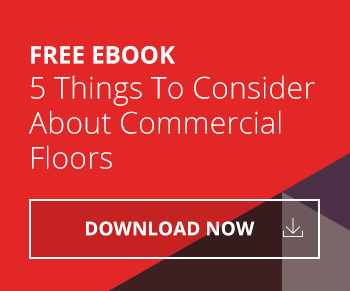When it comes to commercial flooring, you may come across some unfamiliar terms when researching or beginning a project with professionals. To help, we've compiled a handy list that you can reference whenever you need a refresh on these commonly used terms in the world of floors.
- Acoustics – Noise reduction from foot and other traffic is an important factor to consider when selecting floors.
- Bond – This is how flooring material adheres to the surface it is being applied to.
- Colorfastness – How well flooring upholds against a change in appearance caused by fading due to light.
- Durability – The ability of a flooring variety to withstand harsh agents or conditions with which it comes in contact.
- Epoxy adhesive – A chemical agent mixed on the job to adhere a variety of material types to floors. Typically used in areas with exposure to high moisture or harsh conditions.
- Flexibility – The degree of a floor covering material’s ability to be bent, turned, or twisted without cracking, breaking, or showing other permanent damage.
- Gauge – The thickness of a flooring material or a layer within the material.
- Hardwood – Any wood made from deciduous trees. This term has nothing to do with hardness!
- Indentation resistance – The ability of a floor to resist indentations made in flooring, like those created from high heels, furniture legs, or wheeled carts.
- Joints – The junction of pre-cut surfaces butted together, such as tile or underlayment boards.
- Knot – A section of a branch or limb that has grown into a tree, creating a pattern found in wood or wood-looking floors, like LVT.
- Luxury vinyl tile (LVT) – A high-performance flooring material that is durable and crafted to resemble naturally occurring patterns.
- Moisture resistance – The ability of a flooring material to resist water.
- Neutral cleaner – A mild cleaning solution that does not contain strong alkaline materials and will not remove finishes. A neutral cleaner will have a pH of 7.
- Overwood – A term used to describe a condition when adjoining edges of flooring pieces are not the same height after installation. This may also be called underwood.
- Polish – A coating applied to flooring materials to help protect them from wear and tear.
- Quantity – The total measure of flooring material or supply needed to cover an area.
- Roller – A heavy tool used to press vinyl sheeting or tiling into the adhesive to help remove any entrapped air.
- Subfloor – The structural layer under most floors.
- Threshold – A narrow finishing piece placed directly on the floor to cover the transition from one type of flooring to another.
- Underlayment – Material placed under floors to provide a good installation surface.
- Varnish – A finish that contains natural or synthetic oils applied mostly to a wood flooring surface for protection and aesthetic appeal.
- Wear – Gradual deterioration caused from continued use.
We hope these terms are as easy to reference and remember as XYZ!





Comments